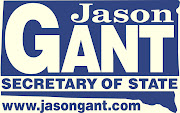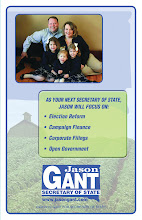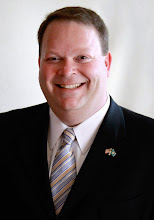There is a great article in the Rapid City Journal today regarding campaign finance laws with respect to corporate involvement.
Senator Jason Gant lead the charge in the legislature to ensure that South Dakota complied with the US Supreme Court ruling governing corporate and union political activities. Senator Gant also made sure that if corporations were involved in political campaigns, they were held accountable just like any other political campaign or political action committee.
Here is the Press Release sent out in March of 2010 regarding this new legislation to hold corporations and unions accountable.
You can also click here to read the Argus Leader Guest Editorial in April 2010 where Senator Gant explained the importance of this legislation.
You can read Senator Gant's bill here.
It is plainly evident that Senator Gant lead the charge to ensure the public would receive nothing short of openness and transparency. While some will follow, Senator Gant is a leader.
Here and below is the Rapid City Journal article.
Secretary of state candidates disagree over campaign finance disclosure law
Kevin Woster Journal staff
rapidcityjournal.com Posted: Wednesday, September 29, 2010 7:00 pm
Democratic secretary of state candidate Ben Nesselhuf said Wednesday that if elected he would introduce legislation to "close the loophole" on corporate spending he fears could unfairly dominate elections.
But his Republican opponent in the race, Jason Gant, said Nesselhuf is coming late to the reform party on that issue.
"To me, this is already in law," said Gant, a state senator from Sioux Falls. "And I passed it, and Ben followed."
Nesselhuf, a state senator from Vermillion, did support a bill that Gant had amended during the 2010 legislative session to require independent spending by corporations on candidate campaigns to be reported with the secretary of state. It also requires the corporate entity purchasing those advertisements to identify itself on the advertisement.
And the reports must be filed with the state within 48 hours of the advertisement being run.
The law only applies to elections for state offices. Federal regulations cover the congressional campaigns. And as of Wednesday, Secretary of State Chris Nelson hadn't received notice of any corporate spending for or against state candidates.
That doesn't mean it won't come, now or in future campaigns, Nesselhuf said. And because of a U.S. Supreme Court decision last winter, a wealthy corporation could easily dominate the advertising in a candidate campaign and determine who wins, he said.
"I think it's only fair to require corporations or unions that are going to spend perhaps millions of dollars to do the same type of expense reports that we expect our state legislative candidates to do," Nesselhuf said.
Nesselhuf's South Dakota Disclose Act also would require that advertisements by a corporation or union include "an appearance by the CEO or union head saying who they are and that they approve the message." That would be similar to the way congressional candidates identify themselves at the end of ads.
A third point in Nesselhuf's plan would prohibit those who receive state loans or grants from "direct electioneering" in the state. That would prevent tax dollars from influencing elections, he said.
"That's the only way to assure that taxpayer dollars don't end up in the political arena," he said.
Gant said trying to ban taxpayer dollars from entering political campaigns would be a fruitless effort with broad implications.
"If you're really talking tax dollars, that would mean anyone on welfare couldn't contribute to a campaign," Gant said. "To me, that all seems terribly unconstitutional and unrealistic."
The transparency issue arose early this year after a U.S. Supreme Court decision loosened restrictions on corporate spending in candidate campaigns allowing corporations to make independent advertising campaign buys in support of candidates. The decision also allows unions to spend independent of campaigns in support of candidates.
Spurred in part by a Sioux Falls mayoral campaign he thought could attract corporate dollars, Gant pushed for legislation to address the issue quickly. The bill was approved with an emergency clause that put it into effect almost immediately.
"With that ruling by the U.S. Supreme Court, it was imperative that our state law be changed to hold corporations accountable, just like others involved in political campaigns," Gant said. "The Supreme Court ruled that they (corporations and unions) could give in unlimited amounts, but it didn't rule whether they had to disclose. So we decided in South Dakota that they did."
Gant took a bill introduced on behalf of Nelson to remove from state law the language prohibiting independent corporate expenditures in campaigns and had it amended. Gant's amendment did remove that language but went further than Nelson was prepared to go. It also required corporate disclosure on the spending for advertisements and a list of corporate directors.
"Jason and I had a difference of opinion on whether it would be constitutional," Nelson said. "The court said corporations can make these kinds of expenditures but left completely open the question of how or whether or not states could regulate that. That's a whole new area."
Nelson said his discussions with the lawyers in the attorney general's office left him unsure about the constitutional question. Nelson had similar questions about Nesselhuf's reporting requirements. If they were similar to what is required of political candidates and political committees, requiring that kind of detail from corporations might not be allowed, Nelson said.
"It gets more sensitive when you're talking about individuals and private corporations," he said.
Whatever the details, more must be done, Nesselhuf said.
"Just think of the potential for influence if somebody like BP got involved," he said. "They could be spending money like crazy."
By Kevin Woster
Thursday, September 30, 2010
Wednesday, September 8, 2010
Sad example of Voter Fraud
Here is a sad story about voter fraud taking place in New Mexico where a dog, yes a dog, was registered to vote. The worst part is "Tuckup" is still registered and received a notice in the mail the other day on where to go vote on Election Day.
As your next Secretary of State, fighting voter fraud will be Jason Gant's number 1 priority!
Dog Registered To Vote In New Mexico
Owner Says He Registered Pet As Independent
POSTED: 9:16 pm MDT September 7, 2010
ALBUQUERQUE, N.M. -- Tuckup -- an 11-year-old black lab and golden retriever mix -- may be the first and only animal registered to vote in New Mexico.
"He's registered as an independent," the dog's owner, Don Pizzolato, said. "I was curious to see if I made up a completely false registration what would happen. Would I receive a voter registration card?"
Pizzolato put Tuckup's name and a fake Social Security number on a registration form several years ago.
"Six weeks later, I received a registration card for him," Pizzolato said.
"Unfortunately, submitting a false or fraudulent voter registration is actually a felony," Bernalillo County Clerk Maggie Toulouse Oliver said.
But it was only after Pizzolato talked about registering Tuckup on a local blog that officials realized the mistake. Then they charged him. He served nine months probation and the case was dropped.
But even after everything played out in the legal system and with an election coming up in November, Tuckup is still registered to vote.
Last week, Tuckup received a notice in the mail telling him where he can vote in November.
"From my experience, they're not even doing the most basic of checking to see who goes on those rolls to make sure they are valid registrations," Pizzolato said.
But the Bernalillo County Clerk said her hands are tied.
"I would actually have to have a court order causing me to remove the voter registration and I still haven't gotten anything yet," Toulouse Oliver said.
So for now, Tuckup can leave his mark at the polls.
Tuckup's owner wants to point out that the dog has never voted, but that he, the owner, could cast one vote under his name and then return and cast another under his dog's name.
As your next Secretary of State, fighting voter fraud will be Jason Gant's number 1 priority!
Dog Registered To Vote In New Mexico
Owner Says He Registered Pet As Independent
POSTED: 9:16 pm MDT September 7, 2010
ALBUQUERQUE, N.M. -- Tuckup -- an 11-year-old black lab and golden retriever mix -- may be the first and only animal registered to vote in New Mexico.
"He's registered as an independent," the dog's owner, Don Pizzolato, said. "I was curious to see if I made up a completely false registration what would happen. Would I receive a voter registration card?"
Pizzolato put Tuckup's name and a fake Social Security number on a registration form several years ago.
"Six weeks later, I received a registration card for him," Pizzolato said.
"Unfortunately, submitting a false or fraudulent voter registration is actually a felony," Bernalillo County Clerk Maggie Toulouse Oliver said.
But it was only after Pizzolato talked about registering Tuckup on a local blog that officials realized the mistake. Then they charged him. He served nine months probation and the case was dropped.
But even after everything played out in the legal system and with an election coming up in November, Tuckup is still registered to vote.
Last week, Tuckup received a notice in the mail telling him where he can vote in November.
"From my experience, they're not even doing the most basic of checking to see who goes on those rolls to make sure they are valid registrations," Pizzolato said.
But the Bernalillo County Clerk said her hands are tied.
"I would actually have to have a court order causing me to remove the voter registration and I still haven't gotten anything yet," Toulouse Oliver said.
So for now, Tuckup can leave his mark at the polls.
Tuckup's owner wants to point out that the dog has never voted, but that he, the owner, could cast one vote under his name and then return and cast another under his dog's name.
Subscribe to:
Comments (Atom)







